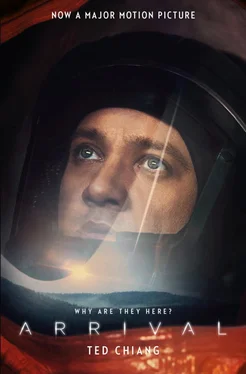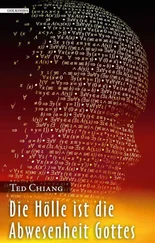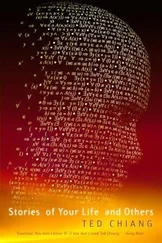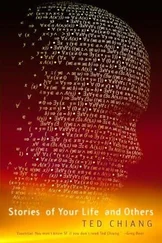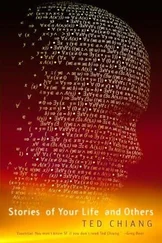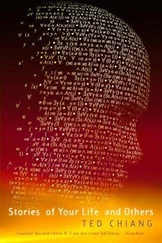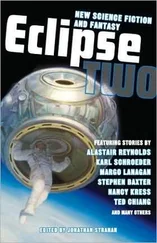Colonel Weber turned. ‘You two,’ he said, pointing to me and then to Burghart, ‘schedule the time and location for the next exchange.’ Then he followed the others to the playback screen.
‘Coming right up,’ I said. To Burghart, I asked, ‘Would you care to do the honors, or shall I?’
I knew Burghart had gained a proficiency in Heptapod B similar to mine. ‘It’s your looking glass,’ he said. ‘You drive.’
I sat down again at the transmitting computer. ‘Bet you never figured you’d wind up working as an Army translator back when you were a grad student.’
‘That’s for goddamn sure,’ he said. ‘Even now I can hardly believe it.’ Everything we said to each other felt like the carefully bland exchanges of spies who meet in public, but never break cover.
I wrote out the semagrams for ‘locus exchange-transaction converse inclusive-we’ with the projective aspect modulation.
Raspberry wrote its reply. That was my cue to frown, and for Burghart to ask, ‘What does it mean by that?’ His delivery was perfect.
I wrote a request for clarification; Raspberry’s reply was the same as before. Then I watched it glide out of the room. The curtain was about to fall on this act of our performance.
Colonel Weber stepped forward. ‘What’s going on? Where did it go?’
‘It said that the heptapods are leaving now,’ I said. ‘Not just itself; all of them.’
‘Call it back here now. Ask it what it means.’
‘Um, I don’t think Raspberry’s wearing a pager,’ I said.
The image of the room in the looking glass disappeared so abruptly that it took a moment for my eyes to register what I was seeing instead: it was the other side of the looking-glass tent. The looking glass had become completely transparent. The conversation around the playback screen fell silent.
‘What the hell is going on here?’ said Colonel Weber.
Gary walked up to the looking glass, and then around it to the other side. He touched the rear surface with one hand; I could see the pale ovals where his fingertips made contact with the looking glass. ‘I think,’ he said, ‘we just saw a demonstration of transmutation at a distance.’
I heard the sounds of heavy footfalls on dry grass. A soldier came in through the tent door, short of breath from sprinting, holding an oversize walkie-talkie. ‘Colonel, message from—’
Weber grabbed the walkie-talkie from him.
I remember what it’ll be like watching you when you are a day old. Your father will have gone for a quick visit to the hospital cafeteria, and you’ll be lying in your bassinet, and I’ll be leaning over you.
So soon after the delivery, I will still be feeling like a wrung-out towel. You will seem incongruously tiny, given how enormous I felt during the pregnancy; I could swear there was room for someone much larger and more robust than you in there. Your hands and feet will be long and thin, not chubby yet. Your face will still be all red and pinched, puffy eyelids squeezed shut, the gnomelike phase that precedes the cherubic.
I’ll run a finger over your belly, marveling at the uncanny softness of your skin, wondering if silk would abrade your body like burlap. Then you’ll writhe, twisting your body while poking out your legs one at a time, and I’ll recognize the gesture as one I had felt you do inside me, many times. So that’s what it looks like.
I’ll feel elated at this evidence of a unique mother-child bond, this certitude that you’re the one I carried. Even if I had never laid eyes on you before, I’d be able to pick you out from a sea of babies: Not that one. No, not her either. Wait, that one over there.
Yes, that’s her. She’s mine.
That final ‘gift exchange’ was the last we ever saw of the heptapods. All at once, all over the world, their looking glasses became transparent and their ships left orbit. Subsequent analysis of the looking glasses revealed them to be nothing more than sheets of fused silica, completely inert. The information from the final exchange session described a new class of superconducting materials, but it later proved to duplicate the results of research just completed in Japan: nothing that humans didn’t already know.
We never did learn why the heptapods left, any more than we learned what brought them here, or why they acted the way they did. My own new awareness didn’t provide that type of knowledge; the heptapods’ behavior was presumably explicable from a sequential point of view, but we never found that explanation.
I would have liked to experience more of the heptapods’ worldview, to feel the way they feel. Then, perhaps I could immerse myself fully in the necessity of events, as they must, instead of merely wading in its surf for the rest of my life. But that will never come to pass. I will continue to practice the heptapod languages, as will the other linguists on the looking-glass teams, but none of us will ever progress any further than we did when the heptapods were here.
Working with the heptapods changed my life. I met your father and learned Heptapod B, both of which make it possible for me to know you now, here on the patio in the moonlight. Eventually, many years from now, I’ll be without your father, and without you. All I will have left from this moment is the heptapod language. So I pay close attention, and note every detail.
From the beginning I knew my destination, and I chose my route accordingly. But am I working toward an extreme of joy, or of pain? Will I achieve a minimum, or a maximum?
These questions are in my mind when your father asks me, ‘Do you want to make a baby?’ And I smile and answer, ‘Yes,’ and I unwrap his arms from around me, and we hold hands as we walk inside to make love, to make you.
When he was a child, Robert’s favorite toy was a simple one, a clay doll that could do nothing but walk forward. While his parents entertained their guests in the garden outside, discussing Victoria’s ascension to the throne or the Chartist reforms, Robert would follow the doll as it marched down the corridors of the family home, turning it around corners or back where it came from. The doll didn’t obey commands or exhibit any sense at all; if it met a wall, the diminutive clay figure would keep marching until it gradually mashed its arms and legs into misshapen flippers. Sometimes Robert would let it do that, strictly for his own amusement. Once the doll’s limbs were thoroughly distorted, he’d pick the toy up and pull the name out, stopping its motion in midstride. Then he’d knead the body back into a smooth lump, flatten it out into a plank, and cut out a different figure: a body with one leg crooked, or longer than the other. He would stick the name back into it, and the doll would promptly topple over and push itself around in a little circle.
It wasn’t the sculpting that Robert enjoyed; it was mapping out the limits of the name. He liked to see how much variation he could impart to the body before the name could no longer animate it. To save time with the sculpting, he rarely added decorative details; he refined the bodies only as was needed to test the name.
Another of his dolls walked on four legs. The body was a nice one, a finely detailed porcelain horse, but Robert was more interested in experimenting with its name. This name obeyed commands to start and stop and knew enough to avoid obstacles, and Robert tried inserting it into bodies of his own making. But this name had more exacting body requirements, and he was never able to form a clay body it could animate. He formed the legs separately and then attached them to the body, but he wasn’t able to erase the seams fully; the name didn’t recognize the body as a single continuous piece.
Читать дальше
